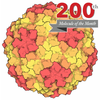[English] 日本語
 Yorodumi
Yorodumi- PDB-6csa: CryoEM structure of human enterovirus D68 emptied particle (pH 5.... -
+ Open data
Open data
- Basic information
Basic information
| Entry | Database: PDB / ID: 6csa | ||||||
|---|---|---|---|---|---|---|---|
| Title | CryoEM structure of human enterovirus D68 emptied particle (pH 5.5 and room temperature) | ||||||
 Components Components |
| ||||||
 Keywords Keywords | VIRUS / genome release / acid | ||||||
| Function / homology |  Function and homology information Function and homology informationpicornain 2A / symbiont-mediated suppression of host mRNA export from nucleus / symbiont genome entry into host cell via pore formation in plasma membrane / picornain 3C / T=pseudo3 icosahedral viral capsid / ribonucleoside triphosphate phosphatase activity / host cell cytoplasmic vesicle membrane / nucleoside-triphosphate phosphatase / channel activity / monoatomic ion transmembrane transport ...picornain 2A / symbiont-mediated suppression of host mRNA export from nucleus / symbiont genome entry into host cell via pore formation in plasma membrane / picornain 3C / T=pseudo3 icosahedral viral capsid / ribonucleoside triphosphate phosphatase activity / host cell cytoplasmic vesicle membrane / nucleoside-triphosphate phosphatase / channel activity / monoatomic ion transmembrane transport / RNA helicase activity / symbiont-mediated suppression of host innate immune response / endocytosis involved in viral entry into host cell / symbiont-mediated activation of host autophagy / RNA-directed RNA polymerase / cysteine-type endopeptidase activity / viral RNA genome replication / RNA-directed RNA polymerase activity / DNA-templated transcription / virion attachment to host cell / host cell nucleus / structural molecule activity / proteolysis / RNA binding / zinc ion binding / ATP binding / membrane Similarity search - Function | ||||||
| Biological species |  Enterovirus D68 Enterovirus D68 enterovirus D68 enterovirus D68 | ||||||
| Method | ELECTRON MICROSCOPY / single particle reconstruction / cryo EM / Resolution: 3.75 Å | ||||||
 Authors Authors | Liu, Y. / Rossmann, M.G. | ||||||
| Funding support |  United States, 1items United States, 1items
| ||||||
 Citation Citation |  Journal: Proc Natl Acad Sci U S A / Year: 2018 Journal: Proc Natl Acad Sci U S A / Year: 2018Title: Molecular basis for the acid-initiated uncoating of human enterovirus D68. Authors: Yue Liu / Ju Sheng / Arno L W van Vliet / Geeta Buda / Frank J M van Kuppeveld / Michael G Rossmann /   Abstract: Enterovirus D68 (EV-D68) belongs to a group of enteroviruses that contain a single positive-sense RNA genome surrounded by an icosahedral capsid. Like common cold viruses, EV-D68 mainly causes ...Enterovirus D68 (EV-D68) belongs to a group of enteroviruses that contain a single positive-sense RNA genome surrounded by an icosahedral capsid. Like common cold viruses, EV-D68 mainly causes respiratory infections and is acid-labile. The molecular mechanism by which the acid-sensitive EV-D68 virions uncoat and deliver their genome into a host cell is unknown. Using cryoelectron microscopy (cryo-EM), we have determined the structures of the full native virion and an uncoating intermediate [the A (altered) particle] of EV-D68 at 2.2- and 2.7-Å resolution, respectively. These structures showed that acid treatment of EV-D68 leads to particle expansion, externalization of the viral protein VP1 N termini from the capsid interior, and formation of pores around the icosahedral twofold axes through which the viral RNA can exit. Moreover, because of the low stability of EV-D68, cryo-EM analyses of a mixed population of particles at neutral pH and following acid treatment demonstrated the involvement of multiple structural intermediates during virus uncoating. Among these, a previously undescribed state, the expanded 1 ("E1") particle, shows a majority of internal regions (e.g., the VP1 N termini) to be ordered as in the full native virion. Thus, the E1 particle acts as an intermediate in the transition from full native virions to A particles. Together, the present work delineates the pathway of EV-D68 uncoating and provides the molecular basis for the acid lability of EV-D68 and of the related common cold viruses. | ||||||
| History |
|
- Structure visualization
Structure visualization
| Movie |
 Movie viewer Movie viewer |
|---|---|
| Structure viewer | Molecule:  Molmil Molmil Jmol/JSmol Jmol/JSmol |
- Downloads & links
Downloads & links
- Download
Download
| PDBx/mmCIF format |  6csa.cif.gz 6csa.cif.gz | 142.5 KB | Display |  PDBx/mmCIF format PDBx/mmCIF format |
|---|---|---|---|---|
| PDB format |  pdb6csa.ent.gz pdb6csa.ent.gz | 108.6 KB | Display |  PDB format PDB format |
| PDBx/mmJSON format |  6csa.json.gz 6csa.json.gz | Tree view |  PDBx/mmJSON format PDBx/mmJSON format | |
| Others |  Other downloads Other downloads |
-Validation report
| Arichive directory |  https://data.pdbj.org/pub/pdb/validation_reports/cs/6csa https://data.pdbj.org/pub/pdb/validation_reports/cs/6csa ftp://data.pdbj.org/pub/pdb/validation_reports/cs/6csa ftp://data.pdbj.org/pub/pdb/validation_reports/cs/6csa | HTTPS FTP |
|---|
-Related structure data
| Related structure data |  7598MC  7567C  7569C  7571C  7572C  7583C  7589C  7592C  7593C  7599C  7600C  9053C  9054C  9055C  9056C  9057C  9058C  9059C  9060C 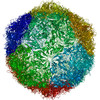 6crpC  6crrC  6crsC  6cruC  6cs3C  6cs4C  6cs5C  6cs6C  6csgC  6cshC  6mziC M: map data used to model this data C: citing same article ( |
|---|---|
| Similar structure data |
- Links
Links
- Assembly
Assembly
| Deposited unit | 
|
|---|---|
| 1 | x 60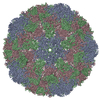
|
| 2 |
|
| 3 | x 5
|
| 4 | x 6
|
| 5 | 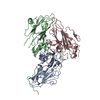
|
| Symmetry | Point symmetry: (Schoenflies symbol: I (icosahedral)) |
- Components
Components
| #1: Protein | Mass: 32920.309 Da / Num. of mol.: 1 / Fragment: UNP residues 565-861 / Source method: isolated from a natural source / Source: (natural)  Enterovirus D68 / Cell line: rhabdomyosarcoma / Strain: US/MO/14-18947 / References: UniProt: A0A097BW12 Enterovirus D68 / Cell line: rhabdomyosarcoma / Strain: US/MO/14-18947 / References: UniProt: A0A097BW12 |
|---|---|
| #2: Protein | Mass: 27112.814 Da / Num. of mol.: 1 / Fragment: UNP residues 318-564 / Source method: isolated from a natural source / Source: (natural)  enterovirus D68 / Cell line: rhabdomyosarcoma / Strain: US/MO/14-18947 / References: UniProt: A0A097BW12 enterovirus D68 / Cell line: rhabdomyosarcoma / Strain: US/MO/14-18947 / References: UniProt: A0A097BW12 |
| #3: Protein | Mass: 27567.135 Da / Num. of mol.: 1 / Fragment: UNP residues 70-317 / Source method: isolated from a natural source / Source: (natural)  enterovirus D68 / Cell line: rhabdomyosarcoma / Strain: US/MO/14-18947 / References: UniProt: A0A1I9KXX3, UniProt: A0A097BW12*PLUS enterovirus D68 / Cell line: rhabdomyosarcoma / Strain: US/MO/14-18947 / References: UniProt: A0A1I9KXX3, UniProt: A0A097BW12*PLUS |
-Experimental details
-Experiment
| Experiment | Method: ELECTRON MICROSCOPY / Number of used crystals: 1 |
|---|---|
| EM experiment | Aggregation state: PARTICLE / 3D reconstruction method: single particle reconstruction |
- Sample preparation
Sample preparation
| Component | Name: Enterovirus D68 / Type: VIRUS / Details: Viruses were grown in RD cells. / Entity ID: all / Source: NATURAL |
|---|---|
| Source (natural) | Organism:  Enterovirus D68 / Strain: US/MO/14-18947 Enterovirus D68 / Strain: US/MO/14-18947 |
| Details of virus | Empty: YES / Enveloped: NO / Isolate: STRAIN / Type: VIRION |
| Buffer solution | pH: 7.2 Details: Phosphate-citrate buffer. Viruses were treated with phosphate-citrate buffer at pH 5.5 and room temperature Celsius, and then neutralized back to about pH 7.2. |
| Specimen | Embedding applied: NO / Shadowing applied: NO / Staining applied: NO / Vitrification applied: YES |
| Specimen support | Grid material: COPPER / Grid mesh size: 400 divisions/in. / Grid type: Homemade |
| Vitrification | Instrument: GATAN CRYOPLUNGE 3 / Cryogen name: ETHANE / Humidity: 80 % / Chamber temperature: 298 K |
- Electron microscopy imaging
Electron microscopy imaging
| Experimental equipment |  Model: Titan Krios / Image courtesy: FEI Company |
|---|---|
| Microscopy | Model: FEI TITAN KRIOS |
| Electron gun | Electron source:  FIELD EMISSION GUN / Accelerating voltage: 300 kV / Illumination mode: FLOOD BEAM FIELD EMISSION GUN / Accelerating voltage: 300 kV / Illumination mode: FLOOD BEAM |
| Electron lens | Mode: BRIGHT FIELD / Nominal magnification: 22500 X / Nominal defocus max: 4800 nm / Nominal defocus min: 900 nm / Cs: 2.7 mm / C2 aperture diameter: 100 µm / Alignment procedure: COMA FREE |
| Specimen holder | Cryogen: NITROGEN / Specimen holder model: FEI TITAN KRIOS AUTOGRID HOLDER |
| Image recording | Average exposure time: 8 sec. / Electron dose: 28 e/Å2 / Detector mode: SUPER-RESOLUTION / Film or detector model: GATAN K2 SUMMIT (4k x 4k) / Num. of grids imaged: 1 / Num. of real images: 144 |
| Image scans | Sampling size: 5 µm / Width: 3710 / Height: 3838 / Movie frames/image: 30 / Used frames/image: 3-16 |
- Processing
Processing
| Software |
| ||||||||||||||||||||||||||||||||||||||||||||||||||||
|---|---|---|---|---|---|---|---|---|---|---|---|---|---|---|---|---|---|---|---|---|---|---|---|---|---|---|---|---|---|---|---|---|---|---|---|---|---|---|---|---|---|---|---|---|---|---|---|---|---|---|---|---|---|
| EM software |
| ||||||||||||||||||||||||||||||||||||||||||||||||||||
| CTF correction | Details: On-the-fly CTF correction during 2D alignment and 3D reconstruction Type: PHASE FLIPPING AND AMPLITUDE CORRECTION | ||||||||||||||||||||||||||||||||||||||||||||||||||||
| Particle selection | Num. of particles selected: 6578 | ||||||||||||||||||||||||||||||||||||||||||||||||||||
| Symmetry | Point symmetry: I (icosahedral) | ||||||||||||||||||||||||||||||||||||||||||||||||||||
| 3D reconstruction | Resolution: 3.75 Å / Resolution method: FSC 0.143 CUT-OFF / Num. of particles: 2150 / Algorithm: FOURIER SPACE / Symmetry type: POINT | ||||||||||||||||||||||||||||||||||||||||||||||||||||
| Atomic model building | Protocol: RIGID BODY FIT / Space: REAL / Target criteria: Correlation coefficient Details: A combination of the following approaches was used: (1) model rebuilding using Coot, (2) real space refinement using Phenix, (3) reciprocal space refinment using REFMAC5 (as in standard ...Details: A combination of the following approaches was used: (1) model rebuilding using Coot, (2) real space refinement using Phenix, (3) reciprocal space refinment using REFMAC5 (as in standard crystallographic refinement). | ||||||||||||||||||||||||||||||||||||||||||||||||||||
| Displacement parameters | Biso max: 336.99 Å2 / Biso mean: 49.1735 Å2 / Biso min: 3.8 Å2 |
 Movie
Movie Controller
Controller


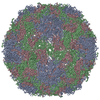
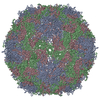
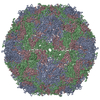
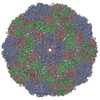
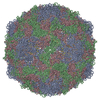
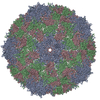
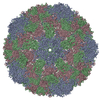
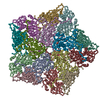
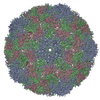
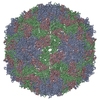
 PDBj
PDBj
